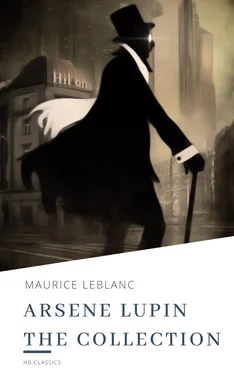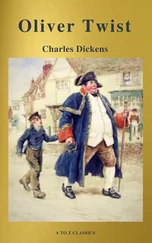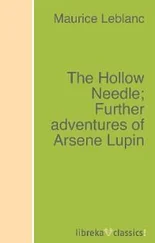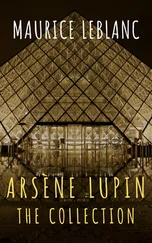"Yes, the gentleman came about ten minutes ago; I showed him into the drawing room. If monsieur will come this way—"
The interview between Massiban and Beautrelet was of the most cordial character. Isidore thanked the old man for the first-rate information which he owed to him and Massiban expressed his admiration for Beautrelet in the warmest terms. Then they exchanged impressions on the document, on their prospects of discovering the book; and Massiban repeated what he had heard at Rennes regarding M. de Velines. The baron was a man of sixty, who had been left a widower many years ago and who led a very retired life with his daughter, Gabrielle de Villemon. This lady had just suffered a cruel blow through the loss of her husband and her eldest son, both of whom had died as the result of a motor-car accident.
"Monsieur le baron begs the gentlemen to be good enough to come upstairs."
The servant led the way to the first floor, to a large, bare-walled room, very simply furnished with desks, pigeon-holes and tables covered with papers and account-books.
The baron received them very affably and with the volubility often displayed by people who live too much alone. They had great difficulty in explaining the object of their visit.
"Oh, yes, I know, you wrote to me about it, M. Massiban. It has something to do with a book about a needle, hasn't it, a book which is supposed to have come down to me from my ancestors?"
"Just so."
"I may as well tell you that my ancestors and I have fallen out. They had funny ideas in those days. I belong to my own time. I have broken with the past."
"Yes," said Beautrelet, impatiently, "but have you no recollection of having seen the book?—"
"Certainly, I said so in my telegram," he exclaimed, addressing M. Massiban, who, in his annoyance, was walking up and down the room and looking out of the tall windows. "Certainly—or, at least, my daughter thought she had seen the title among the thousands of books that lumber up the library, upstairs—for I don't care about reading myself—I don't even read the papers. My daughter does, sometimes, but only when there is nothing the matter with Georges, her remaining son! As for me, as long as my tenants pay their rents and my leases are kept up—! You see my account-books: I live in them, gentlemen; and I confess that I know absolutely nothing whatever about that story of which you wrote to me in your letter, M. Massiban—"
Isidore Beautrelet, nerve-shattered at all this talk, interrupted him bluntly:
"I beg your pardon, monsieur, but the book—"
"My daughter has looked for it. She looked for it all day yesterday."
"Well?"
"Well, she found it; she found it a few hours ago. When you arrived—"
"And where is it?"
"Where is it? Why, she put it on that table—there it is—over there—"
Isidore gave a bound. At one end of the table, on a muddled heap of papers, lay a little book bound in red morocco. He banged his fist down upon it, as though he were forbidding anybody to touch it—and also a little as though he himself dared not take it up.
"Well!" cried Massiban, greatly excited.
"I have it—here it is—we're there at last!"
"But the title—are you sure?—"
"Why, of course: look!"
"Are you convinced? Have we mastered the secret at last?"
"The front page—what does the front page say?"
"Read: The Whole Truth now first exhibited. One hundred copies printed by myself for the instruction of the Court."
"That's it, that's it," muttered Massiban, in a hoarse voice. "It's the copy snatched from the flames! It's the very book which Louis XIV. condemned."
They turned over the pages. The first part set forth the explanations given by Captain de Larbeyrie in his journal.
"Get on, get on!" said Beautrelet, who was in a hurry to come to the solution.
"Get on? What do you mean? Not at all! We know that the Man with the Iron Mask was imprisoned because he knew and wished to divulge the secret of the Royal house of France. But how did he know it? And why did he wish to divulge it? Lastly, who was that strange personage? A half-brother of Louis XIV., as Voltaire maintained, or Mattioli, the Italian minister, as the modern critics declare? Hang it, those are questions of the very first interest!"
"Later, later," protested Beautrelet, feverishly turning the pages, as though he feared that the book would fly out of his hands before he had solved the riddle.
"But—" said Massiban, who doted on historical details.
"We have plenty of time—afterward—let's see the explanation first- -"
Suddenly Beautrelet stopped. The document! In the middle of a left- hand page, his eyes saw the five mysterious lines of dots and figures! He made sure, with a glance, that the text was identical with that which he had studied so long; the same arrangement of the signs, the same intervals that permitted of the isolation of the word demoiselles and the separation of the two words aiguille and creuse.
A short note preceded it:
All the necessary indications, it appears, were reduced by King Louis XIII. into a little table which I transcribe below.
Here followed the table of dots and figures.
Then came the explanation of the document itself. Beautrelet read, in a broken voice:
As will be seen, this table, even after we have changed the figures into vowels, affords no light. One might say that, in order to decipher the puzzle, we must first know it. It is, at most, a clue given to those who know the paths of the labyrinth.
Let us take this clue and proceed. I will guide you.
The fourth line first. The fourth line contains measurements and indications. By complying with the indications and noting the measurements set down, we inevitably attain our object, on condition, be it understood, that we know where we are and whither we are going, in a word, that we are enlightened as to the real meaning of the Hollow Needle. This is what we may learn from the first three lines. The first is so conceived to revenge myself on the King; I had warned him, for that matter—
Beautrelet stopped, nonplussed.
"What? What is it?" said Massiban.
"The words don't make sense."
"No more they do," replied Massiban. "'The first is so conceived to revenge myself on the King—' What can that mean?"
"Damn!" yelled Beautrelet.
"Well?"
"Torn! Two pages! The next two pages! Look at the marks!"
He trembled, shaking with rage and disappointment. Massiban bent forward.
"It is true—there are the ends of two pages left, like bookbinders' guards. The marks seem pretty fresh. They've not been cut, but torn out—torn out with violence. Look, all the pages at the end of the book have been rumpled."
"But who can have done it? Who?" moaned Isidore, wringing his hands. "A servant? An accomplice?"
"All the same, it may date back to a few months since," observed Massiban.
"Even so—even so—some one must have hunted out and taken the book- -Tell me, monsieur," cried Beautrelet, addressing the baron, "is there no one whom you suspect?"
"We might ask my daughter."
"Yes—yes—that's it—perhaps she will know."
M. de Velines rang for the footman. A few minutes later. Mme. de Villemon entered. She was a young woman, with a sad and resigned face. Beautrelet at once asked her:
"You found this volume upstairs, madame, in the library?"
"Yes, in a parcel of books that had not been uncorded."
"And you read it?"
"Yes, last night."
"When you read it, were those two pages missing? Try and remember: the two pages following this table of figures and dots?"
"No, certainly not," she said, greatly astonished. "There was no page missing at all."
"Still, somebody has torn—"
"But the book did not leave my room last night."
Читать дальше












